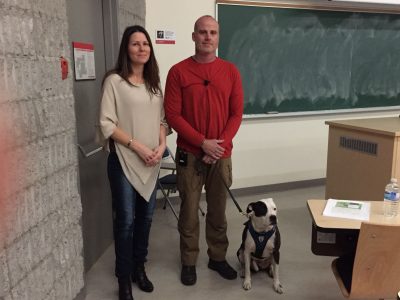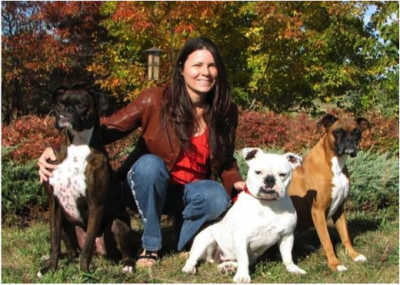 PAWSitive Support: Canine Assisted Interventions in the Treatment of Addictions & Mental Health
PAWSitive Support: Canine Assisted Interventions in the Treatment of Addictions & Mental Health
By Ariel Root
On November 10, Dr. Colleen Dell, Professor and Research Chair of One Health & Wellness at University of Saskatchewan, and retired Captain Marc Lapointe of the Special Forces of the Canadian Armed Forces presented alongside AUDEAMUS service dog Sticker. Together they talked about the impacts of Animal-Assisted Interventions (AAIs), and the need to understand and measure these impacts both from the perspective of the human and the animal.
Dell was appointed a Centennial Enhancement Chair in One Health and Wellness at the University of Saskatchewan in 2016. She was previously a Canada Research Chair studying addictions and mental health. Applying a One Health framework to these works recognizes the importance of a collaborative effort among local, national, and international health and other professions to attain optimal health for people, animals, and the environment.
Dell asks, “What happens when we don’t recognize the bond between animals and humans?” In so doing, Dell emphasized the importance of the human and non-human bond, and with the audience identified many benefits people gain from this bond. “This connection, this bond that we have is incredibly important to us. But it’s ignored” by the health system she explains. It’s not valued when we adopt a medical model of human health.
The human to non-human bond underpins the success of AAIs, though there remains limited empirical evidence regarding AAI effectiveness, and often times data that exists are locally collected and there is little to no sharing of data between institutions. In surveying the Prairie provinces, Dell and colleagues found that the majority of medical services ignore, or do not have training in using AAIs as part of treatment regimes. “We aren’t paying a lot of attention to this, even though [non-humans are] a big part of our families.” Derived from her experience with addictions and mental health, Dell noted that “when you go into an addictions support program, they will ask you lots of questions, [but] will they ask you if you have a companion animal? No. And is that a key support? Absolutely!”
 Working with non-humans, Dell says, means ensuring they are equal partners; they cannot be treated as tools. They play a dynamic and reciprocal role, and their perspective must be understood as integral to that partnership. “They are the intervention. And their welfare is critical. And I do not hear that in the conversations we’re having at all.” Measuring the received love and support from non-humans can be difficult. But for Dell, the two-way bond between humans and non-humans extends past companionship, and increases quality of life. For Dell, this bond is worth discussing, exploring, and integrating.
Working with non-humans, Dell says, means ensuring they are equal partners; they cannot be treated as tools. They play a dynamic and reciprocal role, and their perspective must be understood as integral to that partnership. “They are the intervention. And their welfare is critical. And I do not hear that in the conversations we’re having at all.” Measuring the received love and support from non-humans can be difficult. But for Dell, the two-way bond between humans and non-humans extends past companionship, and increases quality of life. For Dell, this bond is worth discussing, exploring, and integrating.
Even still, Dell honestly admits that in some cases, critics describe these investigations as ‘fluffy.’ Having previously researched Indigenous health, creating tools with community partners, Dell says, “people look at my research, and think that something went wrong… and say ‘you can’t do this’, but yeah I can. There’s so much to learn”. In fact, Dell co-published a peer-reviewed article with Anna-Belle. “I really thought I was going to lose my job over this, but…I wrote an article with my dog in a peer-reviewed journal… called “Questioning ‘Fluffy’: A Dog’s Eye View of Animal-Assisted Interventions (AAI) in the Treatment of Substance Misuse.” And remember [that] Anna-Belle is writing this.”
In using AAIs, researchers must understand and include the non-human perspective. “It’s really important that we always have that animal’s perspective in anything that we’re doing.” Dell says. “Dogs are communicating with us all the time…[and] there is so much to learn there. And personally, I think we haven’t opened up that field because it’s hard to understand, and it’s hard to measure.”
Captain (retired) Marc Lapointe has similarly been working and training service dogs for three years. Lapointe shared examples and insights on the success and impacts of service dogs on mental health. “I train service dogs for special people: veterans, firefighters, police officers, all the first responders,” as well as students, and the private sector. Service dogs can help people experiencing post-traumatic stress disorder, addictions, and substance use and abuse.
But, Lapointe further explained that training doesn’t end with the dog. “We also train the person. We need to read the signs of the dog, and we need to read the signs of the person. It’s not just giving the dog to the person, and saying ‘good day.’” Training the person includes routines, care, and integration specifications.
Lapointe retells experiences from people who have received service dogs. He described instances in which living with a service dog instilled mindfulness, presence, compassion, coping, and re-integration and socialization. The dogs can also help maintain or improve physical health for those who experience night terrors or hearing loss. Those who have received a dog from Lapointe were also required to “give back to the organization” in any way that fosters their preexisting skills or expertise, which further provides a sense of agency and belonging. In all cases, the dogs have been able to provide a sense of hope, belonging, meaning, and purpose to those who are on a path of healing. When it comes to Service Dogs, Lapointe says “it’s life changing”.
You can make at donation to AUDEAMUS here.